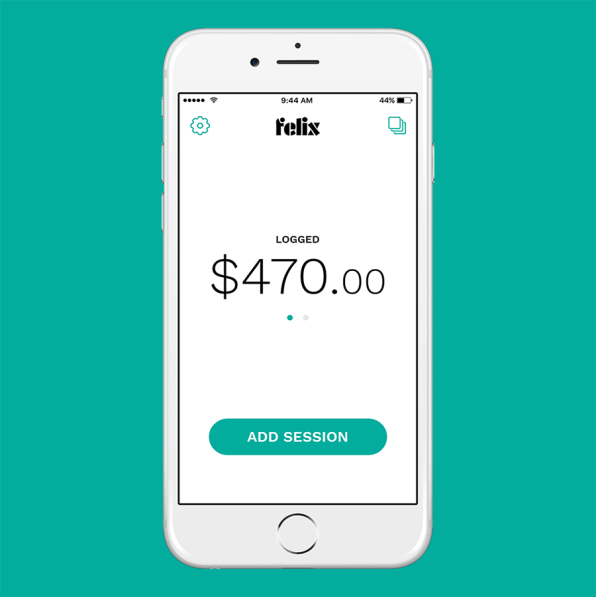June 02, 2017
What’s the one problem freelancers complain more about than anything else? It’s getting stiffed—or getting paid long after the job is done.
With the number of freelancers growing, a group of applications and platforms have emerged to help make money matters go more smoothly. The latest entrant is Felix, a mobile app that lets freelancers set up autopay with clients.
Started by former tutors David Phelps and Thomas Howell, Felix lets hourly workers log their time weekly and invoice clients who agree to issue automatic payments. After each weekly invoice is generated, vendors have 48 hours to cancel if there is a dispute.

In some ways, it provides much of what PayPal does for businesses, but inside a sleek mobile interface that auto generates an invoice based on time, date, hourly rate, and expenses. Like PayPal, Felix charges a processing fee (3.9% plus 30¢). It is aimed at the legions of workers like babysitters, tutors, piano teachers, and swim instructors who offer one-on-one recurring services and are typically paid with cash (or through Venmo).
The emergence of Felix and apps like it indicates that contingent workers have reached a scale to where a market is finally rising to meet their demands. More than one-third of workers are freelancers, according to a 2016 survey. The report found that these workers have two major problems with their self-employed lifestyle: getting paid fairly, and getting paid on time.
“I file invoices, but they just ignore them,” says Katherine Packer, a freelance social media blogger, about her clients. While these tools are beginning to roll out in bigger corporate settings, individual freelancers are still struggling with an antiquated billing system.
Unlike having steady full-time employment, getting paid as a freelancer can often be unpredictable. This has become such an issue that last year, the New York City Council approved the Freelance Isn’t Free Act, requiring businesses to pay contractors no later than 30 days after services have been rendered. The rest of the country has been slow to afford protections for the contingent working class.
Companies are rising up to provide a number of services to bridge that canyon. Work Market, a company that manages freelance workers for big enterprise, launched a way to pay workers faster in February. Another company, Prefer, created an app to help freelancers and self-employed workers manage scheduling, payment, and the process of finding new clients. Intuit too, started to provide tax services for gig economy workers two years ago.
With many of these apps, the ultimate goal is to go beyond just getting people paid.
Felix founders Phelps and Howell see a big opportunity to create a community on Felix, where they can connect workers to information about how much they should be charging clients and potential benefits. That could also manifest through partnerships with companies that provide services like a 401(k) or IRA.
Says Phelps, “The more that we can create a community out of this, and the more that we can create a network where people can exchange advice, share tips, and empower each other, the stronger their businesses will be, and the more money we’ll get paid.”
New app Felix auto-generates an invoice based on time, date, hourly rate, and expenses—and takes nearly 4% of your paycheck.
What’s the one problem freelancers complain more about than anything else? It’s getting stiffed—or getting paid long after the job is done.
Fast Company , Read Full Story
(42)